RESEARCH

RESEARCH
Once again, the Hitching Post served as the location for a Darrtown "Gathering."
On Saturday morning, September 26, 2009, over 30 persons, with connections to Darrtown, came together at the historic tavern to share memories about Darrtown-related people and events.
Ron Wiley served as the Master of Ceremonies. Jack and Betty (Lindley) Daniels, and Fred Lindley helped Ron organize the event.
Everyone was grateful to Hitching Post management for opening the tavern earlier than normal to facilitate the reunion. Coffee and other beverages were available during the session and the kitchen opened at 11:30 A.M. for those who wanted to order food from the Hitching Post menu.
Rebecca Evans spoke briefly regarding efforts to restore the Pioneer section of the Darrtown Cemetery.
The informal theme of this get-together was to share three kinds of memories of Darrtown (first, fondest, and funniest). While the story-telling from those present often wandered from the theme, the sharing elicited much laughter and good feelings (see notes from the story-telling below).
The group was favored with the presence of Fay (Dees) O'Brien, who was clearly the person who traveled the furthest to attend this session. Fay, who lives in southern California, shared some of her memories of Darrtown when her parents operated the Dees Grocery Store in the late 1940's.
Harlan Miller earned runner-up honors for distance traveled as he drove in from the Mansfield, Ohio area. Many in attendance remember that Harlan and his father, Paul "Podie" Miller, provided musical entertainment at some of the earliest Red Huber Christmas parties - in the very same room where today's Gathering occurred.
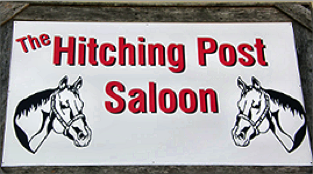
The "Sign-In" sheet for the September 26, 2009 Gathering included the following names:
Fay (Dees) O'Brien
Jewel (Yauger) Hayes
Rose Williams
Larry Simison
Freda Derickson
Gene Derickson
Donna Gallagher
Shawn Gallagher
Jack Wiley
Pat Wiley
"Dutch" Derickson
Jean Derickson
Charles Wagonfield
Delores Wagonfield
Dale Bufler
Margie Bufler
Russell Collins
Ron Wiley
Bill Weiss
Ralph Yauger
Barbara Yauger
Dane Menke
Rebecca Evans
Marna Evans
Janet (Baumann) Jewell
Charles Teckman
Joan Teckman
Linn Weiss
Harry Ogle
Dody Ogle
Deborah Lindley
Fred Lindley
RIGHT: Classmates Together Again!
The four ladies, seen at the right, lived in or near Darrtown during the 1950's and were classmates for several years at the Collinsville Elementary School. (L-R) Betty Jean (Lindley) Daniels, Fay (Dees) O'Brien, Jewell (Yauger) Hayes, and Janet (Baumann) Jewell.
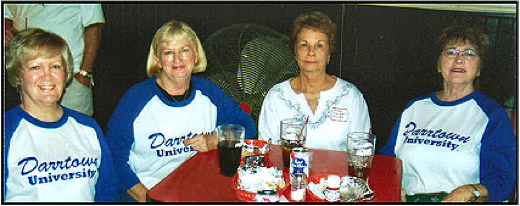
ABOVE (L-R): After the Gathering, this group ate lunch at the Hitching Post. From left to right: Gene Derickson, "Dutch" Derickson, Jean (Steel) Derickson, Pat Wiley, and Jack Wiley. Freda (Stumpf) Derickson, Gene's wife, was away from the table when the above picture was taken. Freda appears at the right.
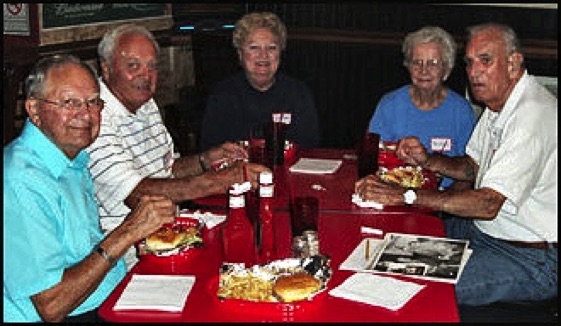
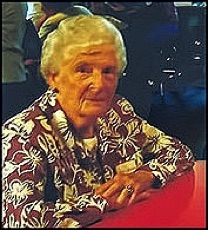
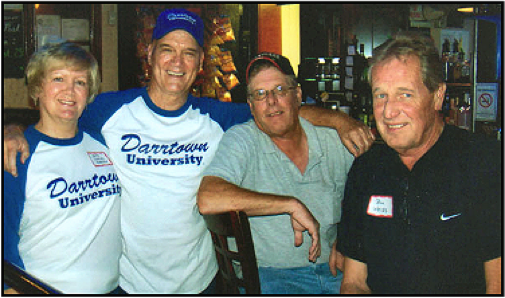
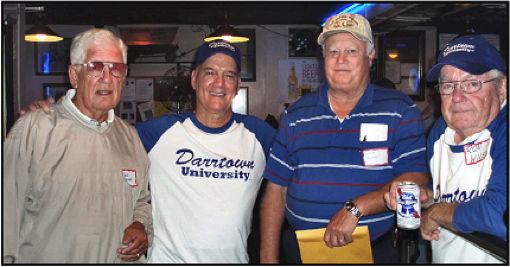
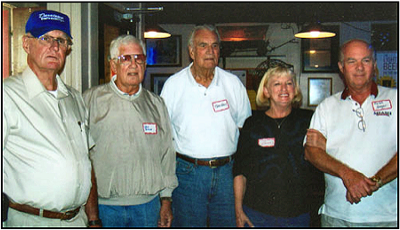
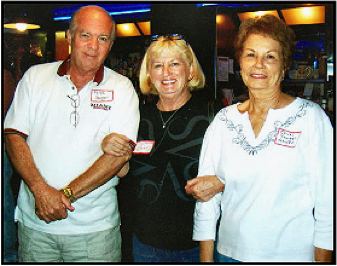
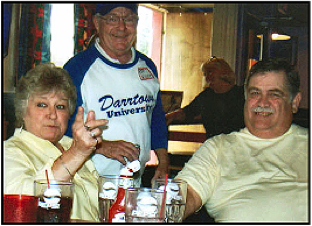
ABOVE (L-R): Dale Bufler, Fred Lindley, Russell Collins, and Ron Wiley.
ABOVE; Ralph Yauger (left) and Jewell (Yauger) Hayes (right) appear above with Fay (Dees) O'Brien (center). Ralph and Jewell are siblings. Fay and Jewell are life-long friends - beginning as classmates at Collinsville School.
ABOVE (L-R): Harlan Miller, Dale Bufler, Jack Wiley, Fay (Dees) O'Brien, and Ralph Yauger. Harlan and Ralph graduated from Stewart High School in 1956, when Dale Bufler was a member of the faculty.
ABOVE (L-R): Donna (Jewell) Gallagher, Ron Wiley,and Shawn Gallagher.
ABOVE (L-R): Four cousins with Darrtown roots; Betty (Lindley) Daniels, Fred Lindley, Linn Weiss, and Bill Weiss.
Bernice (Weiss) Lindley (mother of Betty and Fred Lindley) and Paul Weiss (father of Linn and Bill Weiss) were siblings who grew up on the farm that is located immediately east of the Darrtown cemetery on Schollenbarger Road.
The following notes were compiled from video (thanks to Rick Martin) and audio (thanks to Ron Wiley) and are subject to human error in transcribing. Please send corrections and/or modifications to the the Darrtown Webmaster.
Jack Wiley, assisted by his wife, Pat, recalled:
...when Jack and his parents lived in a house immediately north of the former Glardon grocery store (now known as "Don's Carry-Out). That house no longer exists.
...when Luther McVicker had his garage located in a wooden building located north and east of where it currently is located.
...when the Fisherman's Press occupied the former Darrtown High School building. (Webmaster Notation: The high school sat close to - and facing - Oxford Street on the land now owned by the Darrtown Baptist Church.)
...when dances were held in the former K of P hall and one of the bands/groups that played was called the “Look-Em-Up Boys,” because several of the musicians had drooping eyelids and they had to look up to see.
...when Bink Bufler was the local (and only) jeweler in town and Grandpa Bufler had a repair shop in the house where “Doc” Alston lived [that would be in the southwest corner of Main and Apple Street].
...when many residents of Darrtown and the surrounding area had nicknames (see the “Nickname” section at the right).
...when Ernie and Bell Miller operated the Darrtown Telephone Company (see the “Darrtown Telephone” section below).
...when Virgil Alston delivered the newspaper at a running pace, which doubled as a training session, for his participation as a competitive runner.
...when a local company manufactured fluorescent light bulbs in the Kirk Mee barn at the north end of town. Dale Bufler confirmed this story by adding that his parents had one of those fluorescent lights in their kitchen.
...when Peter Leibrick grew willows on his property at the north end of town. Pete and his wife, Myrt, lived across from the Darrtown Lutheran Church, just north of Teckman’s house - or, in other words, the second house north of the intersection of State Route 177 and North Street. Ron Wiley recalled being told that Johnny Darr grew willows (and celery) on the land behind the Teckman property - on east North Street. Ron recalls several willow trees in that section of town. It is told that Johnny Darr created furniture from the willow wood (see "Early History - Johnny Darr.")
Delores (Uhl) Wagonfield recalled that there was a time when it was common practice, among those who lived in or near Darrtown, to give nicknames to each other.
Delores, Jack Wiley, and Dale Bufler offered the following from their memories:
> Emmons “Toby” Alston
> Stanley “Doc” Alston
> Walter “Smokey” Alston
> William “Bink” Bufler
> ____ “Cheesy” Brincefield
> Harry “Hap” Davish
> Theodore “Doe” Decker
> Hugh “Fat” Decker
> Ed “Hoot” Fowler
> Ellis “Dugan” Glardon
> Earl “Red” Huber
> Paul “Podie” Miller
> ____ “Babe” Ramsey”
> Eugene “Newt” Wagonfield
> Clyde “Punce” or “Junior” Wagonfield
> Glenn "Hockey" Ward
> B. M. “Vic” Wyckoff
Webmaster Note: Other nicknames have been submitted, since the Sept. 26, 2009 Gathering. Those names appear below.
Agusta "Gussie" Gaiser
Warren "Rock" Hansel
Raymond "Crow" Wiley
Lewis "Swack" Teckman
Joe "Turkey Neck" Pater
Richard "Dudley" Bufler
As additional nicknames surface, they will be added.
In his opening remarks (above), Jack Wiley recalled that Ernie and Bell Miller operated the Darrtown Telephone Company in the 1930’s and 1940’s. Ernie Miller sold and installed the poles, wires, and telephones. Bell served as the switchboard operator. The switchboard was located in the Miller home, which sat in the southeast corner of State Route 177 and Scott Road.
Ron Wiley continued the conversation about the Darrtown Telephone Company by referring to the time (circa 1930's through the early 1940’s), when telephones stood upright, in "candlestick" style, with the mouthpiece mounted near the top of the upright section and the ear piece connected by a cord to the phone. This phone did not allow telephone users to dial desired numbers. When would-be callers wanted to place a call, they would pick up the ear piece and an operator, working a central switchboard, would answer. The caller would ask the operator to place/connect a call to the desired party. The switchboard operator would then make the connection between the two parties.
Ron then shared his memory of Bell Miller, when she was the primary switchboard operator for the Darrtown Telephone Company. Ron remembered that Bell would pleasantly interact with persons who wished to place a call and frequently provided extra information that she had gleaned from earlier phone calls. For example, one might ask Belle to call a certain family and Belle would inform the caller that said family was not home at the time, as (for example) the family members had to go to the Sears and Roebuck store in Hamilton - or some designation or event.
Ron added that, during this time period, the phone network consisted of “party” lines - with multiple users sharing the same line. Ron remembers that his family shared their party line with seven (7) other families. Ron’s family knew a call was for them, when they heard one long and two short rings. The Wileys were expected to ignore rings of different combinations that were intended for other families on the party line. However, it was not uncommon for some individuals to “listen in” to calls intended for others. Ron described how the quality of the sound would decrease as each additional person would pick up the phone - to the point that some calls had to be terminated, because it became impossible to hear the other person.
In the mid-1950’s, Darrtown’s phone system was taken over by the Oxford telephone system and the dial phones replaced the central operator. Callers could “dial” a number themselves through the use of a dial on the face/front of the phone. Consequently, individual telephones were assigned their own identification - which in the early 1950’s consisted of various combinations of numbers and letters; for example, Betty (Lindley) Daniels recalled that the Lindley family’s phone number was 709X.
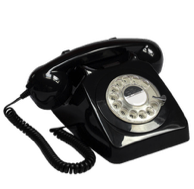
The remarks about Belle Miller and telephones prompted Jean (Steele) Derickson to share her memory of being a young girl in Darrtown who spoke with Belle whenever she (Jean) wanted to make a telephone call. Often, Jean wanted to call her friend, Joan Teckman and Jean had to ask Belle to ring Joan's home phone. Jean recalled times when she or Joan were ill and stayed home from school. When the girls would call each other at the end of the school day, Belle, while connecting the two phone lines, would inquire about the health of the girl who was under the weather.
Another memory of Jean’s centered on an incident that she experienced at the Darrtown Methodist Church when she was a young girl. At that time, Jean blissfully believed that, on Christmas Eve of each year, a jolly old elf of a man came from the North Pole to leave gifts under the family Christmas tree. Another girl her age (who Jean graciously declined to identify) was seated to Jean’s left at a table in the church and Jean remembers to this day that the girl seemingly took great delight in telling Jean that Mr. Claus did not exist. Jean said she eventually forgave the girl, who “actually turned out to be a nice person” as an adult.
Jean explained that she learned to play the piano by taking piano lessons from Virginia Teckman and Jean fondly recalled that she played in a small group that included Virginia’s daughter, Joan, and son, Charles. Occasionally, Mary Lee Fogerty joined in.
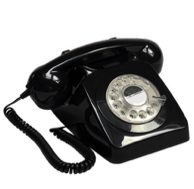
Another
story...
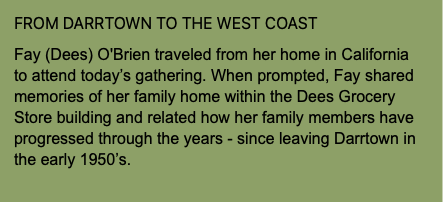
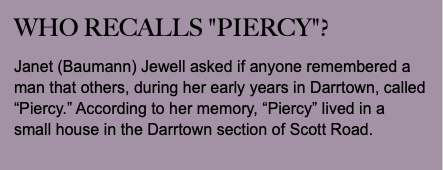
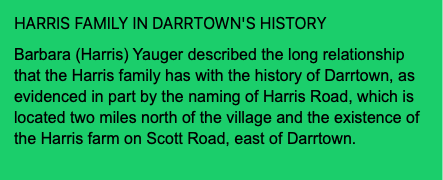
Ron Wiley recalled a variety of stories from Darrtown’s past:
The Old High School Building: Building on Jack Wiley’s memory of the Fisherman’s Press being housed in the Darrtown High School, after the school was closed, Ron Wiley described seeing the heavy-weight presses that were installed in the building as part of the publication business - even though some townspeople thought the old building was so weakened that it should be condemned. Ron added that, after the Fisherman Press closed, the old school was used as a farm implement business - with a ramp installed, so that farm equipment could be driven into the structure. According to Ron's memory, eventually, the school building was condemned - as a political/legal requirement, before the structure could be razed.
Civil Defense: Ron asked if anyone recalled the “blackouts” that were instituted during World War II. He shared the memory of those blackouts when he saw Harry Teckman drive around town in his car with only his parking lights turned on to assure that all house lights were turned off through out the village. Ron also asked if anyone remembered the watchtower that sat near the middle of town. His recollection is that the tower was used as a part of the aerial watch program - otherwise known as the Ground Observer Corps. Fred Lindley then shared a story that Kirk Mee II had told him about Darrtown’s involvement in the GOC program during the early 1950’s (see "Ground Observers Corps - Darrtown, Ohio - Early 1950's).
Crime Stories: The talk about observing and being alert for trouble may have sparked Ron Wiley’s memory about criminals as he then shared a story that was told to him about John Dillinger who occasionally resided (hid out) at the Erbeck farm, which is located about 1.5 miles east of Darrtown on Scott Road. Dillinger’s presence in the area was related to the Prohibition Era. During that time period, all sales of alcohol were prohibited. Black-market sales, bank robbers, and bootleggers flourished. In the process, Hamilton, Ohio became known as “Little Chicago,” as Windy City gangsters would frequent the Butler County seat when things “got hot” in Chicago.
During this period of Prohibition, Darrtown's Hitching Post, which was owned and operated by Ron Wiley's grandfather, became a delicatessen store and Ron’s grandparents passed down the story that John Dillinger occasionally came into the deli to purchase various items - while staying on the Erbeck farm, east of Darrtown on Scott Road.
Constable Kelly: The thought of a criminal living in the Darrtown area triggered Ron Wiley’s recollection of how Darrtown came to have its very own peace officer during the mid-1950’s. Ron shared the story about how he and Fred Lindley were instrumental in getting Owen Kelly elected as Darrtown constable.
It all started with Fred’s father, Al Lindley serving as a precinct judge in the Darrtown primary and general elections, which were conducted in the K of P hall. One fall, a few days before the November election, Al mentioned to Fred, that the ballot that was printed for the Darrtown precinct routinely included the position of town constable - but no one ever ran for the unpaid position. Fred shared this bit of information with Ron and the two teenagers began to discuss how funny it would be if Darrtown had its own constable. That’s all it took; the two friends began plotting a clandestine write-in campaign.
For reasons no longer remembered, the two boys decided that Owen Kelly would be the best candidate - and the best way to get Owen elected was to get his name before the public - before the election. So, after acquiring poster paper and paint, the two boys were soon on their hands and knees on the kitchen floor of the Lindley home - cranking out election signs that carried a variety of "Vote for Kelly" themes, including: "Clean-up City Hall - Vote for Kelly" and "Stop the Graft - Vote Kelly for Constable."
Next, in the darkness of the night before Election Day, Ron and Fred posted the signs on doors, trees, and telephone poles up and down Darrtown’s Main Street. Their efforts included a “Kelly for Constable” paper banner of some 10-12 feet in length, which was fastened to a rope that they stretched from a tree to a telephone pole, across Main Street, in front of Luther McVicker’s garage. Unfortunately, they quickly learned that they did not hang the banner high enough above street traffic. Within minutes of climbing down from the ladder that they used to secure the rope and the banner in place, a six-wheeler barreled down Main Street and the tall trailer that it was pulling ripped down the boys’ largest campaign sign.
However, that turned out to be the only setback to their campaign efforts. At the end of Election Day, Owen Kelly won in the proverbial landslide; Darrtown voters had elected a constable!
Several in attendance at today's gathering recalled that Owen Kelly proved to be an outstanding volunteer constable. Although he had limited legal standing, soon after that eventful election, Owen purchased an official-looking cap and added a temporary red light to the roof of his car. Many people recognized that Owen’s presence along Main Street served as a deterrent to speeders. Also, Owen frequently contributed to the safety of travelers who crossed through the intersection of State Route 73 and 177 north of town as Owen Kelly spent many hours parked at that crossroads in his pseudo-police car on those autumn Saturdays when football fans were traveling to and from Miami University in Oxford, Ohio.
Hitching Post Christmas Parties: Ron Wiley also recalled the Christmas parties that Earl “Red” Huber, former owner of the Hitching Post hosted in the 1950’s. Ron was among the couple of dozen kids and adults who attended the first Christmas party - which grew in size during later years to the point that hundreds attended, with some arriving in cars that sported license plates from Indiana and Kentucky. Remembering that Harlan Miller and his father provided musical entertainment at the earliest Hitching Post Christmas parties, Ron recalled another “musical memory.” Ron talked about the time that he and his good friend, Fred Lindley, walked from a Hitching Post Christmas party to Ron’s home on Cherry Street to open and enjoy some of the items included in the Hitching Post gift bag (an orange, an apple, and a popcorn ball were among the much appreciated items). Ron explained that he and Fred - like many Darrtown youth at the time - were members of the Darrtown Union Sunday School choir. And, so, while sitting on the front porch of the Wiley home, the two boys created a special song, whose lyrics were sung to the religious classic, “We Three Kings.” The opening stanza included the words, “We three kids from Darrtown are - bearing gifts from Red Huber’s bar…” Ron added that he and Fred thought about singing those lyrics for the choir director, Mrs. Agusta “Gussie” Gaiser - but, he could not remember that they ever succumbed to the temptation.
Webmaster Notes:
The following information, obtained from an Internet search, is provided in support of Ron's comment that Hamilton, Ohio was once known as "Little Chicago."
From: The Answer Bag: "In the 1920s, many Chicago gangsters had second homes in Hamilton. This gave Hamilton the nickname "Little Chicago." John Dillinger is documented to have been a visitor to Hamilton. During World War II, due to the large number of gambling and prostitution establishments such as Madame Freeze's and the long row of prostitution establishments along Wood Street (now called Pershing Ave), the entire city was declared off-limits to military personnel."
From: The Hamilton Journal: "Exactly when and why the Hamilton area was first called Little Chicago is unknown. Whatever the reason, the label has endured, even though the conditions that spawned the infamous sobriquet haven't existed for decades.The city acquired the nickname early in the Prohibition Era (1919-1933) because of similarities with the Windy City. By the mid 1920s, Hamilton, Ohio -- like Chicago, Ill. -- was known for its bold and open defiance of prohibition and other laws and moral codes. "It is easier to buy moonshine than milk" in Hamilton, claimed a crusading minister in 1925. Prohibition -- which was supposed to stop the manufacture, transport, sale and even the possession of intoxicating beverages -- started in Ohio May 27, 1919."
Ron Wley's "crime" story (at the left) takes on added credibility when one considers the layout of the Erbeck property. The Erbeck farm buildings (house and barn) were - and still are - very isolated; the buildings sit in a low area that makes if difficult to see the structures from Scott Road. The house and barn are located about ¾ of a mile north of Scott Road and are accessible by way of a gravel and dirt lane. The Erbeck farm lane entrance begins slightly opposite the former, one-room brick school house that still stands (October 2009) near 2134 Scott Road (this school building No. 11 was where the Quick family lived during the early 1950's). In a conversation with life-long Darrtown resident, Rick Martin following the September 26 gathering, Ron and Rick remembered that, in addition to the long lane off Scott Road, the Erbeck farm had another lane that runs about ¾ of a mile north from the farmhouse to State Route 73. That realization seems to give lend credence to the Dillinger story, if one agrees that a hideout with a back exit might have special appeal to a criminal “on the lam.”
Donna (Jewell) Gallagher shared two memories from Darrtown
Seeing Harlan Miller present at this September 26th “Gathering” triggered a memory for Donna as she recalled, when she was a young girl, sitting on the back porch of the Jewell home (on Walnut Street) and listening to Harlan and his father sing - from the Miller home, a couple of houses away, on Apple Street.
Donna also shared a memory of Belle Miller; in the mid-1950’s, when Donna was dating Freddie Lindley, Belle would occasionally approach Donna at a Sunday morning church service to remark that, “Freddie got home late Saturday night.” Belle was referring to the hour that she heard Freddie pass through town on his way home from his date with Donna. (Editor’s Comment: Belle’s comment, about hearing Freddie’s car pass by, was the result of the teenager driving a 1941 Chevy with a split manifold and glass pack dual mufflers - known to some as “cherry bomb” mufflers. By letting off the accelerator, those dual mufflers fairly “cackled” with a deep, “throaty” sound that echoed between the buildings on Main Street.)
Dale Bufler regaled the audience with a grave-digging story from a time when he worked as a teenager in the Darrtown Cemetery (see "Recollections of Dale Bufler").
Then...a person in the audience, who knew of another episode from Dale's past, ...asked him to tell about the time that he and some friends make an after-hours run to the Hitching Post.
Dale obliged, as he told about the time that he and some friends (Junior Wagonfield among them) who, after playing cards into the early morning hours, developed a considerable thirst for a particular kind of liquid (the name of which starts with the letter “g” and rhymes with the word “win”).
The card-playing compatriots were confident that Earl “Red” Huber, proprietor of the Hitching Post tavern, would welcome some after-hours business and off they went, walking through the night darkness to the back door of the local pub.
The boys knew that Mr. Huber lived above the bar and it seemed logical to them that "good-old Red" could easily accomodate their quest for liquid refresment, even though it was after closing time. After knocking several times, the lads were pleased to see the door slowly open.
The young men quickly identified themselves and eventually, after politely explaining their plight, the tavern owner accommodated them in their mission to quench their nocturnal thirst.
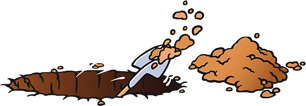
Whereupon, Mr. Huber, standing at the other end of the gun, ominously asked, “What do you boys want?”
The September 26, 2009 Gathering ended, after approximately two hours of sharing memories.
Harlan Miller's reflections
Harlan Miller, who lived in Darrtown from the late 1940’s until he joined the Marines out of high school in 1956 (see Recollections of Harlan Miller) drove approximately 200 miles (from his home in Mansfield, Ohio) to attend today’s gathering. Harlan seized the opportunity to express his gratitude for lessons learned during his Darrtown years. In particular, Harlan cited the work ethic that he acquired while baling bale hay with the Reiffs and the Kane brothers. He spoke highly of his educational experiences at the Collinsville and Oxford Stewart schools. And then, Harlan turned to Dale Bufler and thanked him for creating and coaching the Darrtown “Purple Skunks.” Harlan described the valuable role that Dale served in the lives of many Darrtown boys. Many in the audience agreed and a round of applause followed Harlan’s tribute.
Ron Wiley acknowledged Virgil Alston
Ron referred to Jack Wiley’s opening remarks and Jack’s mention of Virgil Alston delivering newspapers on the run. Ron shared a memory from when he was a young boy growing up in Darrtown. Virgil Alston, who was about eight years older than Ron, would often chat with Ron, as Ron rode his bicycle around town. Virgil would refer to Ron’s bike as a “wheel” and would ask if Ron wanted to race his bike against Virgil’s legs. (Ron added that Virgil always won the races against Ron’s “wheel.”) That memory prompted Ron to reflect on Virgil Alston’s success as a long distance runner for Miami University. In particular, Ron cited Virgil’s upset victory in the two-mile run at the 1942 Drake Relays. Additionally, Ron spoke with pride and satisfaction regarding his efforts to promote Virgil Alston as being worthy of membership in the Miami University Athletics Hall of Fame. Ron cited Darrtown native Kim Ogle as being instrumental in compiling a record of Virgil’s track accomplishments, which ultimately led to Virgil’s induction into the Miami University Athletics Hall of Fame class of 2006.
However, their pleasure turned to panic, when, to their surprise, through the door-opening, came the business end of a serious-looking handgun.
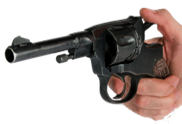



Click the following links to jump to these items that are further down this page

√
√
(1) 2009, Apr. 18
(2) 2009, Sept. 26
(3) 2011, Sept. 10
(4) 2012, Apr. 21
(5) 2013, Dec. 08
(6) 2016, Oct. 06
BONUS!
Fay (Dees) O'Brien traveled from her home in California to attend this event. Click the following link to see some photos that Fay took during her visit.

